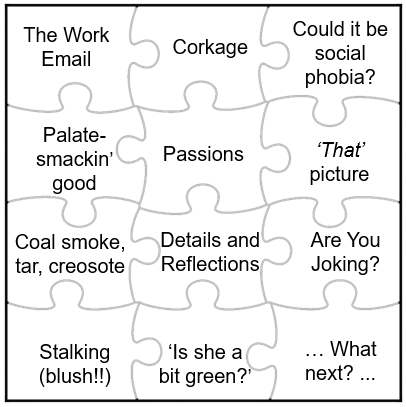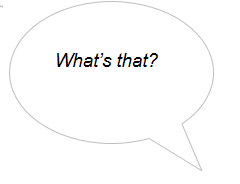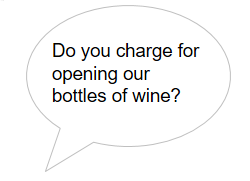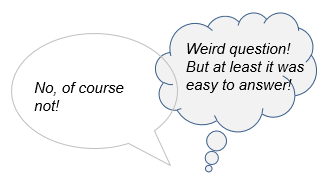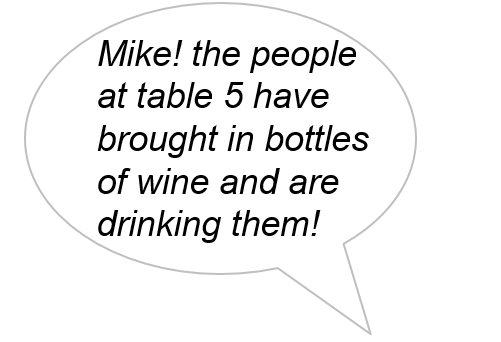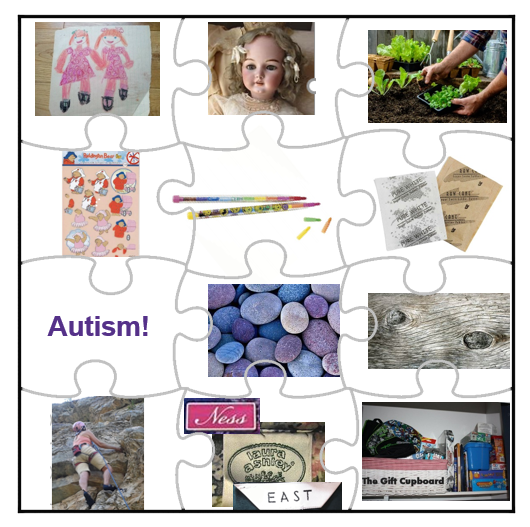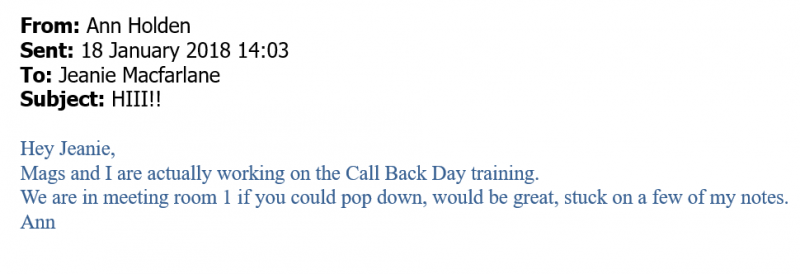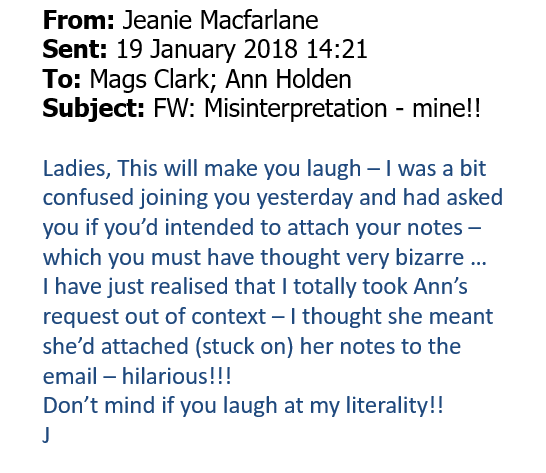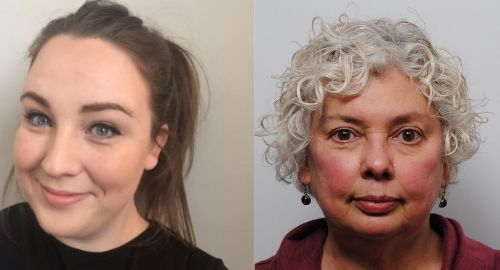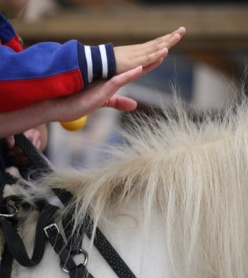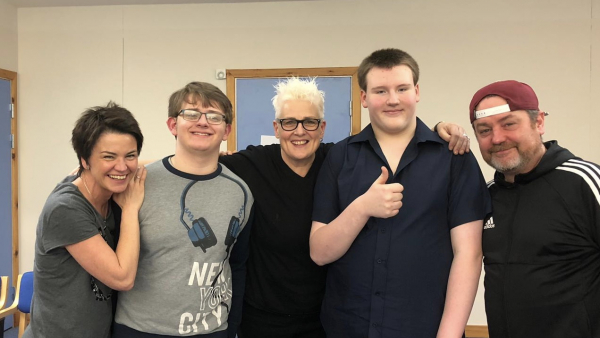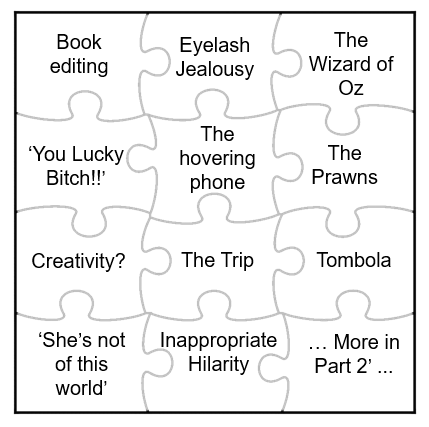Grasping the Nettle by the Horns: Living and Working with my Autistic Thinking – Part 2
Jeanie Macfarlane, Senior Autism Advisor, Scottish Autism
My jigsaw pieces are mounting up! Piecing together aspects of my development that indicate autism has been a fascinating, at times uncomfortable, erratic but ultimately rewarding experience. I still get flashes of recognition where some or other memory my brain’s clung onto for over 40 years suddenly emerges to add to my personal jigsaw. I’m reminded of Donna Williams in her film Jam Jar from 1995 describing (as I remember it) the way it wasn’t that she was able to sit down and type her autobiography but that, as she sat at her typewriter, the words came to her. Intriguingly, as she read back what she’d typed, she then started to make sense of her life.
I hope that you’ll now read on to enjoy some more of ‘Jeanie’s jigsaw pieces’:
‘That picture’
Primary 6 or 7. I’m innocently drawing a picture of a boy while my peers press around me, enjoying and admiring my detailed rendition unfolding. However, it all went wrong when they started to giggle and out of nowhere the teacher swooped down violently, yanked my jotter from the table, twisted it up and flung it in the bin. ‘Don’t you EVER draw anything like that again!’
Can you guess the degree of innocent stitching detail I’d drawn on his shorts, without seeing the bigger picture of how my peers perceived it? It took me years to fathom this one out. My drawing was of the detailed stitching of the ‘fly placket’. I failed mentally to, literally, join the dots (or rather, dashes)!
‘Corkage’
I’m now 17 and have a summer job in a restaurant with generous hands-on owners. A large group comes in to the restaurant and the following scene unfolds:
Them:
Me: Them: Me:
Five minutes later, I’m running through to the manager...
OK, so Mike should really have trained me up on what corkage was - I had thought they were asking if we charged to un-cork wine bought from the restaurant! But there’s another issue here too – my natural inclination is towards honesty and fairness but the flip side to this is that you see me here running off to tell a tale straight away! And, worse still, I had absolutely no realisation that it was my words that had led them to believe they could drink their own wine for free!!
‘Coal smoke, tar, creosote’
To that I’ll add ‘musty’ facecloths. Yes! I’m afraid that my mother obviously didn’t wash our facecloths often enough because I discovered an addictively musty, mouldy smell on mine and would sit in the bath smelling and, I’m afraid, sucking it… as a teenager! And my Theory of Mind does extend to an awareness that you may be totally cringing right now on my behalf, or recoiling in disgust, reading this!
Seriously, despite being overly sensitive to a range of obnoxious smells which don’t seem to affect others (or they’re far too polite to mention them), I always sought out certain pungent odours, including standing behind our car when the engine was on, inhaling the (then leaded) fumes. Nevertheless, there was always a tipping point at which I would start to feel nauseated by too much of a good thing. Fortunate, really, as many of my favoured aromas were quite toxic.
‘Palate-smackin’ good’
Not long after starting work supporting autistic adults, my manager was pondering why a particular person would ‘smack’ his tongue repeatedly against the roof of his mouth with a content, distanced, facial expression. This was a no-brainer: I also did this, albeit in a more subtle way, while simultaneously breathing out (try it!) to prolong and intensify the taste of whatever I’d been eating. It’s also the reason why I can appear to take long drinks but barely reduce the level in my glass: by forcing the drink through the narrow space I create between tongue and palate I gain a far more intense, long lasting and enjoyable flavour and drinking experience.
I remember my manager looking at me appraisingly and with, I thought, incredulity and great respect at my insight. Perhaps in fact she was considering whereabouts on the spectrum I fitted!
‘Stalking (blush!)’
When starting Art School I suddenly found myself without friends, and at a loss as to how to make new ones. A peer whom I’d observed to be a bit ‘different’ became the focus of my attention and I would pursue her (not quite relentlessly!) until we became friends. Through this, my social circle expanded in an associative, if not truly friendship-based, manner. Long before I started making clear connections between autism and myself she herself was wondering if she could be on the spectrum.
This presaged my fascination in the last 10 years or so for piecing together clues about people who struck me as being autistic. I wondered about, and avidly researched, a certain TV Naturalist’s Asperger’s diagnosis years before he ‘came out’. This was propelled by reading that he went through a phase of inserting a line from a Smith’s song into his presenting wherever he could and from watching his on-screen relationship with his co-presenters. This behaviour held equally for people I came across in my own life.
There. I’ve said it. I’ve stalked people! But I no longer have this burning desire; it’s as if, with my own diagnosis, the need to track down people ‘from my country’ has receded. So you’re safe!! Instead I have now set myself the slightly uncomfortable mission of trying to inform people of my autism diagnosis to widen their understanding, and hopefully consideration, of others on the spectrum or who don’t fit the stereotype.
‘Is she a bit green?’
I was 19 and joining my boyfriend’s family for a meal out with visiting relatives. I feel humiliated recounting this, but towards the end of the meal his very brash, American great aunt leant over to his mother and enquired, without bothering to lower her voice, ‘is she a bit green?’ Although I wasn’t entirely sure of the meaning of this term, I had a good idea that it involved my presentation of immaturity; innocence and lack of experience in life as well as my ‘odd’ and uncomfortable social presentation. I was exceedingly embarrassed both by the fact that this was her interpretation of me and that she said it loud enough for everyone to hear. Now I wonder, was this an issue with me or with her interpersonal skills?
‘Could it be Social Phobia?’
I came across this condition in my late 20’s and at last felt I wasn’t the only person to feel engulfed by terror and physical sickness at the prospect of social occasions such as a group meal out or being dragged to a party. Even day-to-day interactions had spiralled downwards, from feelings of social awkwardness but desire to be involved, to high levels of discomfiture. Not that having a ‘label’ for my experiences helped much, as it didn’t lessen these feelings, but it sat alongside an emerging awareness (and battle to disguise the fact) that I ‘ticked many boxes’ for a diagnosis of Asperger’s syndrome.
I negotiated the social minefield of my 30’s and 40’s, fortunately enjoying some positive interactions and relationships. Before clinical depression set in in my mid 40s, I had built only a fragile degree of resilience and developed a toolkit of excuses for avoiding those situations that engulfed me with anxiety. After a decade of extremely painful, bloated stomachs at certain times, which my GP attributed to stress, I now have a ‘healthier’ toolkit. This includes managing my diet carefully during what I have identified as my ‘trigger times’.
Accommodations at work and disclosing to colleagues has been life changing. Vitally, once disclosed, I found that my brain was no longer continually wracked and distracted by what I thought other people were thinking of me in social settings such as meetings, allowing me to process more of the topics under discussion. Most of all, perhaps, I now feel more valued and validated at work.
Getting into energetic hillwalking, mountaineering, skiing and rock climbing has proved highly stress reducing as well as enjoyable (addictive even!) and provides valuable ‘flow-activity’ which helps balance out the more stressful parts of my life. Joining a mountaineering club provided shared interest with others. Through this club I met my husband: the most innately accepting and appreciative-of-neurodiversity-and-difference person I have ever come across; and who valued everything about me (well, almost - we have our differences, musical taste and his passion for football being two of them!)
‘Are you joking?’
This seemingly trivial comment was in fact a major piece of my personal jigsaw!
Eventually, in my mid 30’s, I one day found myself with the confidence to momentarily stop masking and pretending and actually say this to a colleague. It was a revelation really as before I’d simply laughed with the herd or kept miserably quiet. I can’t actually remember what he’d said on this occasion, or what the reply to my question was, but this is unimportant.
Sadly, this new found confidence didn’t last and 10 years later, with mounting anxiety, things were spiralling downwards for me; a theme for many ‘coping on the surface’ autistic adults I’ve come across. All-engulfing depression and despair finally kicked in. My spiralling anxiety, much of it due to social situations, was totally controlling my life. My processing time was ‘out the window’ and I was totally paranoid and consumed by rumination on mistakes, perceived or actual digs from others, sabotage and so on.
In contrast to my ability to ask ‘are you joking?’ and all that this signified in my 30’s, around this time a trusted colleague made a passing comment to me and my beleaguered brain couldn’t figure out what she meant. Before I knew it, my mouth had responded with ‘are you being cheeky?’ I was then paralysed with horror and paranoia as by saying that I felt I had sounded incredibly out of order. What I’d meant to ask was ‘are you joking?’ as, again, I wasn’t sure where she was coming from.
Instead, I disappeared into the toilet then spent a day and a night caught up in ruminations about what she and her colleagues who were present thought of me and whether they would report my behaviour. I then addressed the issue with her and, unsurprisingly, she hadn’t given it a second thought!
Living with anxiety disorder and depression was sheer hell. On the positive side, these experiences have given me more insight into, and empathy with, others and I also know that, due I suppose to my concrete thinking style, I had always found it difficult to relate to these conditions until I experienced them myself.
‘The Passions’
Amidst all these difficult social situations and misinterpretations I enjoyed my mid teenage years once I’d earned the respect of previously bullying and excluding peers. Something that has really buoyed me up throughout my life is my capacity for solitary occupation, and indeed bliss in being on my own doing something and collecting and enjoying things that I love.
The picture above shows some passions, past and present. Most of these have been enduring or evolved into a similar interest. Even as a pre-5 year old I got a special feeling from making a plant grow and have never lost the intense satisfaction and ‘flow state’ I get from being around plants; reading about gardening; watching gardening programmes; buying gardening paraphernalia (especially plants!)... Now I feel a part of my allotment community; a feeling that has become more embedded ever since revealing both my depression and then Asperger’s diagnosis to the president and recognising his steps to include me without social pressure. However I felt a bit of a mis-fit in my earlier adulthood as no-one my age seemed to garden intensely. Indeed my passion for collecting clematis varieties was once picked up on by a colleague in a way that I thought at the time was suggestive of being autistic - and not in a nice way.
Identical twins, and drawing them ad infinitum, is the first passion I remember. As I grew older, this evolved into creating paper dolls … identical paper doll twins! By the time I was 14 (blush) I was drawing twin babies and toddlers who were the only-ever-to-be-imagined offspring of my classroom crush and I!
What about the antique bisque dolls? Well as a child I desperately tried to acquire what I called ‘brittle dolls’ (due to their delicate, hard plastic construction) then loved reading books that featured dolls from a previous era. As an art student this passion was rekindled by my friend’s mother’s antique doll collection and I became obsessed with collecting dolls. I researched them and tracked down contemporary clothes, patterns and pieces of antique fabric to make them costumes. I frequented Christies and Phillips auction houses. Having my own son diverted this passion into something much more meaningful; however I still have my dolls tucked away and try hard not to get pulled back into the allure of rekindling this particular collecting frenzy!
Do you remember transfers? Aged around 6 I would go to extreme lengths to acquire transfers, such was my intense fascination for their seemingly magical qualities of being able to be transferred onto another object (if I could bear to actually use them, that is!). After trying to acquire my friend’s Paddington Bear transfers, I clearly remember her mother having a very serious conversation with me, sitting on the window seat on their half-way landing. She was not chiding me for my behaviour but instead obviously struck and puzzled by the intensity of my feelings for transfers and trying to get me to explain my feelings around this. She must have been a very perceptive woman.
I wasn’t always trying to obtain other kids’ coveted transfers however: from mid-childhood I had a ‘thing’ about giving presents. One of the clubs I formed in primary school was, in fact, ‘The Present Club’. The purpose was for the handful of members to knit or otherwise make presents from materials we bought with pooled money. I was very much in control but the club didn’t last long. This passion then shaped itself into stocking a ‘present box’, as read about in one of my story books. I still do this, albeit now with a bursting-at-the-seams ‘present cupboard’. I do however, need to make sure that I don’t just give people the things that I like!
Stationery and toiletries, Pop-a-Point pencils (what on earth was it about them that ‘just did it for me’?), later Laura Ashley dresses and, in the last few years, East dresses and Ness handbags. Stones and driftwood? Very contemporary but I probably take it to extremes in my enjoyment of their beauty and textures. Part of how I define autism in myself is the intense pleasure I get out of certain things whether they be objects, smells, sights, tactile feelings or experiences of activities such as rock climbing. In recent years it has increasingly seemed to me that this sensation goes over and above what other people seem to experience.
When life throws so much challenge and uncertainty one’s way, one has to cling onto the good things. This is why I start to worry when I hear of the dilemmas around some autistic people being encouraged to reduce their treasured ‘rubbish’. What magical qualities do these prized items actually hold for them? But then again, when does an intense passion tip over into a pronounced imbalance in someone’s life or indeed a hazard. I’d urge anyone supporting an individual in this context to be extremely sensitive to their perhaps hidden feelings around these precious objects or interests. Our passions are what get us through the hard times and make life worth living, whether they are universally understood as legitimate interests or completely whacky!
‘Details and reflections’
When studying for my autism degree, in contrast to my difficulty making sense of Theory of Mind in relation to autism, the theory of ‘weak central coherence’ fitted perfectly in many ways. I aligned myself with this detailed thinking style more easily than I did other prevailing psychological theories (possibly due to their manifestation within me blinding myself to their presence) and it seems I have WCC to thank for my lifelong love of detail and reflections.
I was good at art, although my art was less about self-expression and more about extremely accurate rendering of objects and scenes that I found intensely beautiful and engrossing. In my mid-teens I’d spend literally hours making quite exquisite black and white pen drawings of water slipping out of a running tap or the reflections and refractions on a crystal glass or broken mirror. It was capturing the patterns of light and movement that entranced me. I often wonder if this fascination is part of the attraction to water; splashing water and similar sensory experiences enjoyed by some other autistic individuals.
For Higher Art, I had a wonderful teacher, Mr Strachan, who would pounce on my precise images, such as a wine glass and botanical illustration, and encourage me to combine them into a broader concept, such as a poster or model theatre set. I went along with this and got happily pre-occupied along the way with exploring details of calligraphy and spray painting. It struck me while reflecting on this that Mr Strachan actually used the simplest and best principle for supporting an autistic person: focus on the person’s strengths and what they enjoy doing. It’s much easier to make small but progressive changes when you’re feeling within your comfort zone and valued. Those repetitive and detailed drawings and activities provided me immeasurable pleasure. However breaking these boundaries, in our own good time and through sensitive exploration, may provide new delights; I now regret not pushing the boundaries and exploring sculpture, pottery or stained glass more.
Age 11, a shy elder cousin and I ended up sharing hilarity (in retrospect nervous laughter) and absorption watching a drop of the purple juice I was drinking go rolling down my dress. It was the detail that we both noticed: the drop didn’t soak in but rolled down and at the same time, because of its spherical shape, magnified the weave of the fabric as it rolled, shining and shimmering, its surface tension never breaking, till it hit the floor. And then we went back to being shy and gawky with each other – it was hard continuing the interaction. Surprise, surprise, she has also recently emerged as autistic.
Mightn’t this be the sort of detail that some individuals in autism services pore over? If not water drops then perhaps the grain of wooden furniture; the pattern and texture of their skin; the pattern of saliva on their hand… hidden beauty is all around us but also in the eye of the beholder and has powers to attract, distract and entrance.
Sadly for me, long-sightedness now means that I need glasses to really enjoy the tiny details. This has got me wondering about the loss that may be felt by individuals whose sight; sense of smell, hearing or whatever may be reducing through age and time. What can we do to recognise, support and compensate for this? Of course, on the positive side, it also can mean that we aren’t so aware of unpleasant sensory inputs such as smells.
‘The work email’
Now that I’ve grown into my ‘autistic skin’ somewhat I can enjoy, and enjoy sharing, some of the harmless double meanings and misunderstandings that crop up from time to time. Here are some recent emails illustrating just this (names changed):
How would you interpret this?
I emailed back asking for the attachments as they weren’t there. Then the next day I processed my misinterpretation and sent this:
Ambiguity is a commonly experienced problem with emails, however for me this type of confusion happens a bit too often, and not just through emails! I tend to reply too quickly whereas if I give a bit more processing and reflection time I may arrive at a different interpretation. However perhaps others would have considered that there was more than one interpretation, and checked, or simply taken the absence of attachments as the context?
My life seems filled by this type of misunderstanding, and when it wasn’t supported by a diagnosis that was accepted and understood by others the ensuing anxieties were exacerbated. Getting to the grand old age of 51 has helped but its infuriating that things that other people just glide over cause me consternation and dilemmas.
_________________
Although my jigsaw now feels so complete, new pieces still continue to arrive to puzzle me, and maybe others. I do hope that by sharing these, some of you reading them will have your own ‘flashes of recognition’ as something I’ve said slips into place for you. Perhaps this will be in connection to someone you support or know. Perhaps, however, this person may be yourself ... this may either be a scary realisation; a ‘Eureka!’ moment or something in-between. Please don’t be alone in this – there are many sources of support out there to help you navigate this road. One of these resources is our own Autism Advice Line here at Scottish Autism. Any queries are confidential and you can access support via this link or on 01259 222 022.
Conversely, you may already have been wondering if you, or someone you know, may be on the spectrum but after reading my reflections feel these don’t relate to your situation in the slightest. It’s important to highlight, then, that my experiences are my own particular expression of autism and some of the ways that the differences around social communication and interaction, thinking flexibly and sensory aspects play out in me. How this is reflected in you, or another person, is likely to vary considerably.
Others of you again will hopefully be more informed about your own understanding of the diversity that is the autistic spectrum after reading this.
Please try to understand us!
We can be exceedingly sensitive – we may have had years of knowing we’re different and of feeling scrutinised…
We have got to where we are now through decades of challenging concrete experiences and often a different, harder learning pathway to many neurotypical people…
We can seem naïve, slow to catch on, maybe frustrating…
But we may also feel very easily patronised when you attempt to accommodate this!
Our social differences, stress, insecurity and anxiety may come out in ways that make you feel uncomfortable.
Alternatively, we may (sometimes) be very good at pretending and masking!
And I know that being so-called neuro-typical isn’t a smooth journey either….
Finally, in the right environment, with the right understanding, support and encouragement from you, we can build resilience, flourish and give back!

